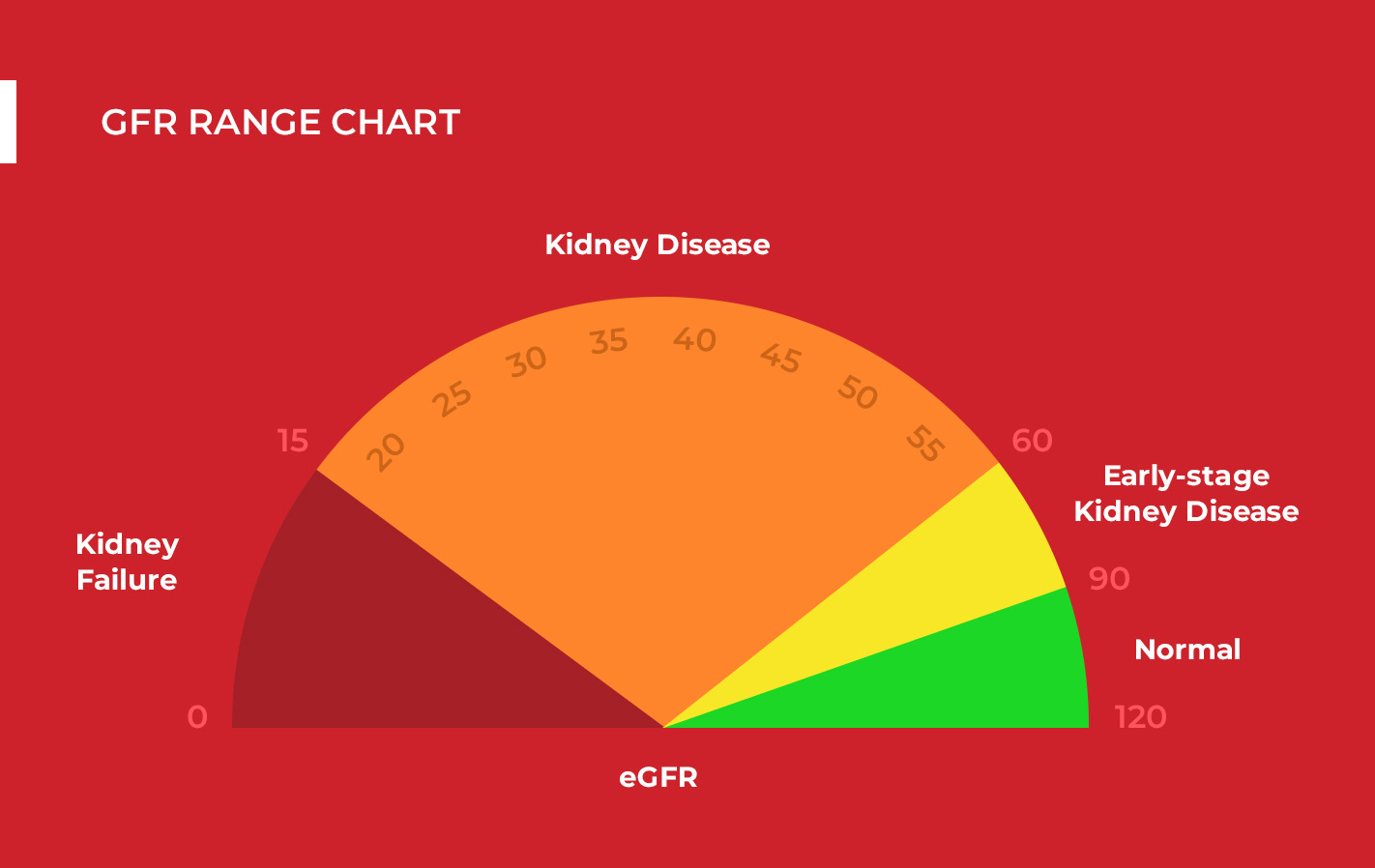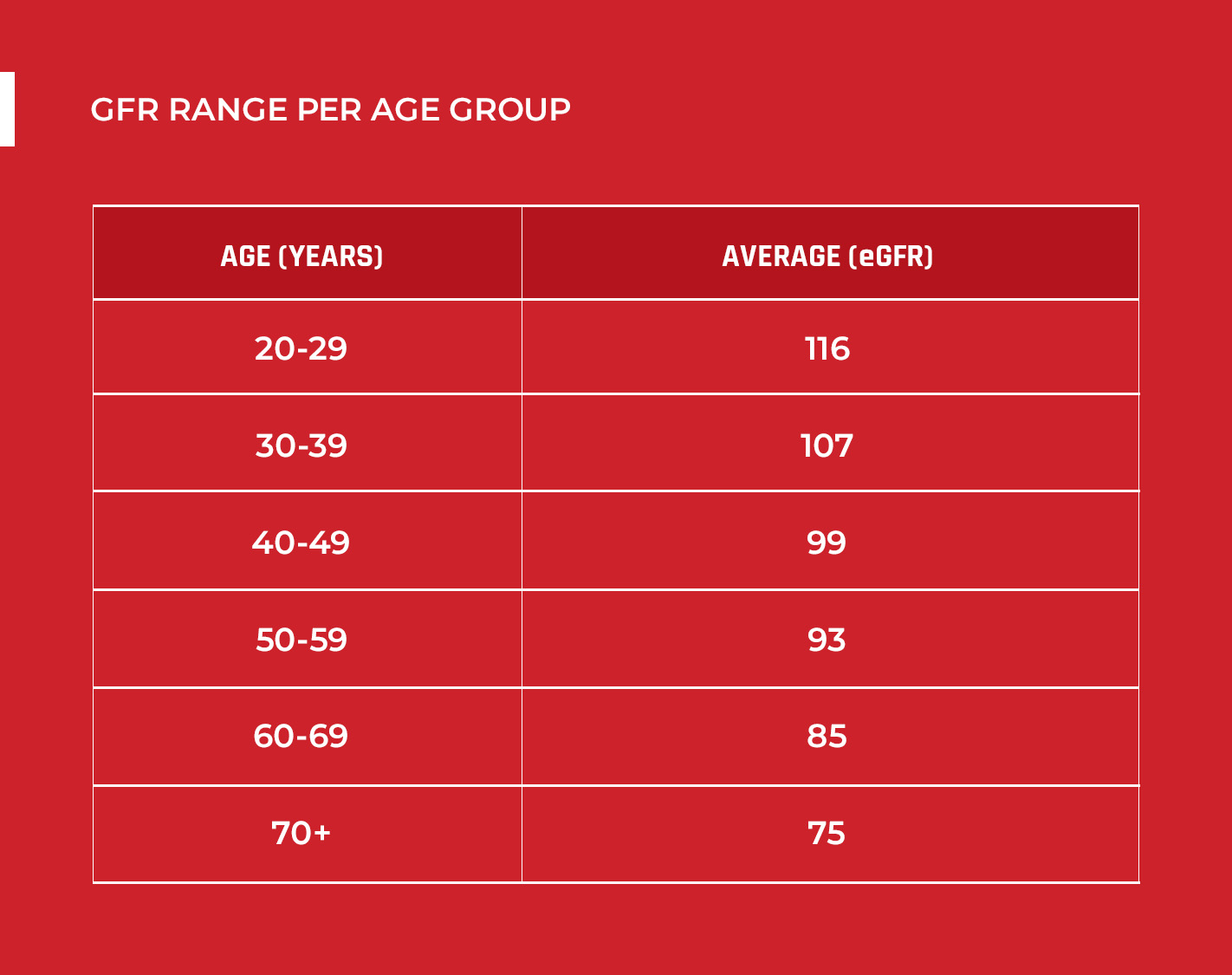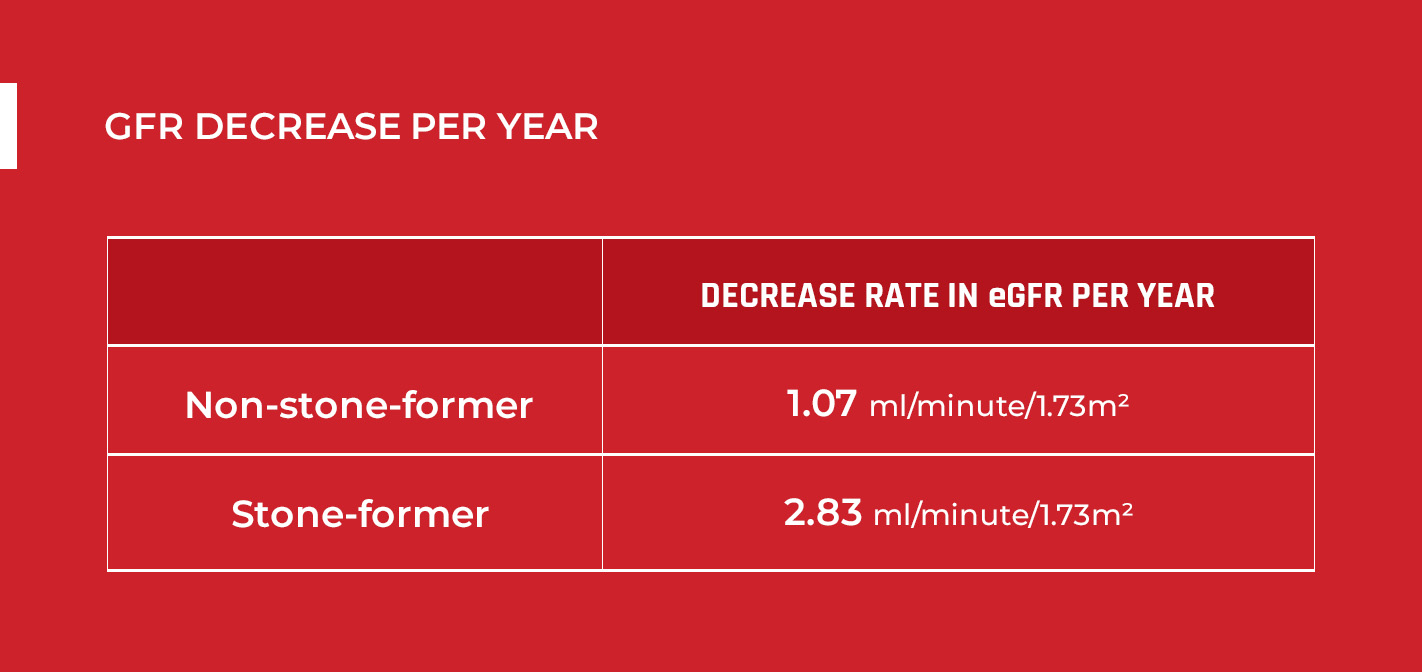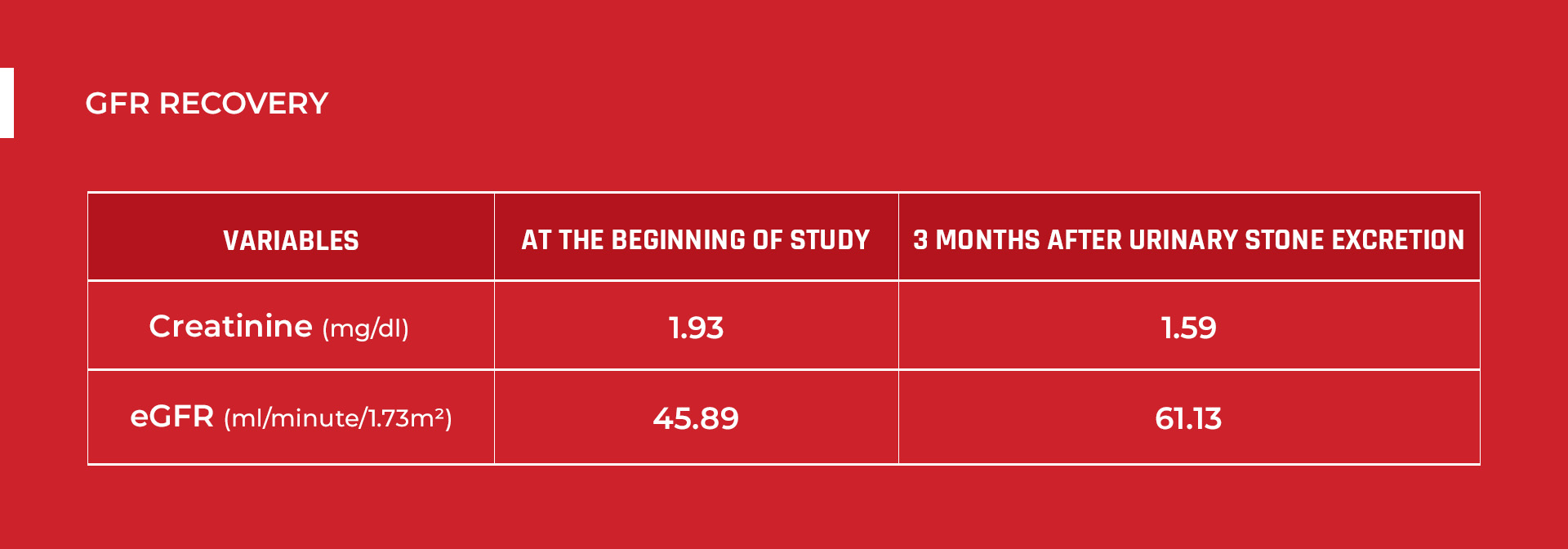Published: January 28, 2024 | 8 mins read
Do Kidney Stones Impact Kidney Function (GFR)?
The kidneys play a vital role in maintaining our overall health and well-being. When it comes to measuring the health of our kidneys, Glomerular Filtration Rate (GFR) is used to assess kidney function. Monitoring GFR is crucial in detecting kidney disease at an early stage and initiating timely treatment to prevent further deterioration.
In this article, we will explore how kidney stones affect your kidney function and what you can do to reverse it and prevent kidney deterioration in the long run.
WHAT IS GFR?
GFR measures the amount of blood filtered by the glomeruli, the tiny filters in the kidneys. It is expressed in milliliters per minute per 1.73m2 body area (ml/min/1.73m²).
Blood flow and pressure from the heart drive this filtration process. However, the kidneys can control the filtration rate. Filtration plays a crucial role in removing waste products from the blood, such as oxalate, and enables us to eliminate excess water, salt, and other substances we consume daily through food and drink.

HOW IS GFR MEASURED?
One way to estimate GFR is through creatinine levels in the blood. Creatinine is a waste product produced by the muscles and filtered by the kidneys. So, the amount of creatinine in our blood shows how much is being produced by our muscles and how well the kidneys are filtering it. If the kidney’s filtering ability decreases, the level of creatinine in the blood goes up. A “good” creatinine level is below 1.2 mg/dL.
However, to get a more accurate estimate, medical professionals compare blood creatinine levels to actual kidney filtration rates. GFR is typically measured using techniques that involve injecting a marker substance (either inulin or iothalamate) into the bloodstream and then monitoring how quickly the kidneys clear it from the blood. This gives a direct measurement of how efficiently the kidneys are filtering blood. However, these measurement techniques can be complex and may require specialized equipment.
Thus, a mathematical technique called estimated GFR or eGFR is also used. This formula takes into account factors like age, sex, and race, along with creatinine levels.
In adults, the normal GFR number is usually around 90. A GFR below 60 may suggest kidney disease, while a GFR of 15 or lower indicates kidney failure.
Generally, GFR declines with age, even in individuals without kidney disease. The average estimated GFR per age group is shown in the chart below:

This estimated GFR, or eGFR, has become a key tool in medical practice. When doctors talk about reduced kidney function, they refer to a decreased eGFR, which indicates that the kidneys might not be filtering the blood as well as they should.
HOW DO KIDNEY STONES AFFECT GFR?
Patients with kidney stones often have other health problems like diabetes, high blood pressure, and gout. However, more and more research indicates that kidney damage specific to kidney stones is also happening. Thus, recurring kidney stone episodes can contribute to declining kidney function.
Studies on animals with blocked urine flow in one kidney showed inflammation and scarring in the kidney’s small tubes and the surrounding areas. Because of this, white blood cells called macrophages were seen just 4 hours after the blockage started. The same kind of kidney tissue damage can happen to people with their first kidney stone episode.
Even though their creatinine levels in the blood returned to normal after the stone was gone, they still had higher protein levels (e.g., cystatin C) in their urine. This is a sign of poor kidney filtration. Thus, it suggests higher risks of kidney problems.
Also, when urine flow is blocked (a.k.a. hydronephrosis), the trapped urine can cause the affected kidney to swell, putting pressure on the kidney’s structures and causing the tiny filtering units to compress. This causes damage to the filters (a.k.a. glomeruli).
KIDNEY STONES DECREASE EGFR
One study involving records of 72,521 healthy individuals for 8 years showed significant changes in kidney function. In that study, the average eGFR was 83.7 milliliters per minute per 1.73m2. It went down by about 1.07 milliliters per minute per 1.73m2 each year.
Meanwhile, another study involving patients suffering from kidney stones showed a more significant average decline in eGFR. It was about 2.83 milliliters per minute per 1.73m2 each year. This difference suggests kidney function declines more quickly in patients who often get kidney stones.
In another research study done in Iceland, they looked at 195 adults who had recurrent kidney stones (at least 6 months apart). They also noticed that compared to non-stone-formers, stone-formers had lower kidney function. Even after considering factors like body size, high blood pressure, diabetes, and heart disease, eGFR remained lower for kidney stone-formers.

OTHER FACTORS AFFECTING KIDNEY FUNCTION
There are still other factors that can impact kidney function. These are as follows:
Comorbidities
Chronic diseases such as high blood pressure (a.k.a. hypertension) can result in low GFR. That’s because when the blood vessels become constricted, blood flow to the kidneys is reduced. This impairs the kidney’s ability to filter effectively.
In the same way, diabetes (Type 2) is notorious for damaging kidney function. The high levels of glucose (sugar) in the blood associated with diabetes can cause damage to the small blood vessels and nerves throughout the body, including those in the kidneys. This damage is referred to as diabetic nephropathy. Moreover, diabetes can contribute to inflammation and oxidative stress, further promoting kidney damage and leading to a decline in GFR. Oxidative stress pertains to the imbalance between the production of reactive oxygen and the body’s ability to neutralize it.
Urinary tract issues
Conditions surrounding the urinary tract, like blockages, infections, loss of one kidney, or surgical injuries, can cause reduced kidney function too.
Stone composition
Non-calcium-containing stones, like struvite and uric acid stones, have been associated with worse kidney function. However, future studies are yet needed to further prove this connection.
The use of NSAIDs
Certain medications, such as nonsteroidal anti-inflammatory drugs (NSAIDs) for pain relief, can negatively impact kidney function. That’s because NSAIDs have been proven to cause acute kidney injury.
Stone size
Larger stone sizes can damage small blood vessels in the kidney and thus can also cause lower GFR.
Age
Studies have shown that age plays a role in the decline of kidney function, even after considering other health issues.
RECOVERY PERIOD AFTER THE STONE PASSAGE
When hydronephrosis (urine back-up) resolves, GFR also tends to increase. In the same way, when hydronephrosis gets worse, kidney function worsens too.
The recovery period after passing a kidney stone can vary depending on factors such as the severity of hydronephrosis, the degree of kidney injury, and underlying diseases. Nevertheless, in a study involving 224 patients, the estimated GFR (eGFR) increased after the stone removal, indicating improved kidney function.
At the beginning of the study, the mean creatinine levels were 1.93 mg/dL. But it lowered to 1.59 mg/dL three months after the stone removal. Additionally, eGFR increased from 45.89 ml to 61.13 ml.

IS STENT PLACEMENT BENEFICIAL FOR KIDNEY FUNCTION?
One study involving 138 patients with urine obstruction showed that GFR improved after stent placement. The first group, consisting of 57 patients (41.3%), had ureteric stents placed. The second one, composed of 81 patients (58.6%), underwent treatments other than stent placement.
The improvement in kidney function was assessed using eGFR. In Group I, 56 kidneys (71.8%) showed a significant improvement in eGFR after ureteric stent placement. In contrast, 61 kidneys (66.3%) did not show positive results in Group II.
This further proves that once stuck urine is released, GFR will improve. It’s not the stent that improves kidney function but the relief of hydronephrosis (urine back-up).
CONCLUSION
Since recurrent kidney stones can cause kidney damage, you must focus on preventing future stone formation by making appropriate dietary and lifestyle changes.
Even chronic diseases leading to impaired kidney function are linked to diet. Heart conditions, hypertension, and diabetes are mostly related to the foods you eat unless you have genetic disorders.
So if you want to make the right dietary shift to solve your kidney stone problems and many chronic health issues, feel free to check out our Coaching Program.

Comments or questions?
Responses
WHAT TO READ NEXT
Publish Date: June 23, 2024
Do You Have a Phosphate Leak Leading to Kidney Stones?
Publish Date: June 9, 2024
The #1 Genetic Cause Of Kidney Stones: Cystinuria Disease
Publish Date: May 26, 2024
Distal Renal Tubular Acidosis Leads To Calcium Phosphate Stones